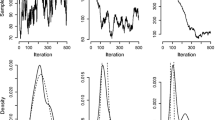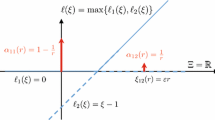Summary.
We find that in cumulative prospect theory (CPT) with a concave value function in gains, a lottery with finite expected value may have infinite subjective value. This problem does not occur in expected utility theory. The paradox occurs in particular in the setting and the parameter regime studied by Tversky and Kahneman [15] and in subsequent works. We characterize situations in CPT where the problem can be resolved. In particular, we define a class of admissible probability distributions and admissible parameter regimes for the weighting- and value functions for which finiteness of the subjective value can be proved. Alternatively, we suggest a new weighting function for CPT which guarantees finite subjective value for all lotteries with finite expected value, independent of the choice of the value function. Some of these results have already been found independently by Blavatskyy [4] in the context of discrete lotteries.
Similar content being viewed by others
Author information
Authors and Affiliations
Corresponding author
Additional information
Received: 14 October 2004, Revised: 6 May 2005,
JEL Classification Numbers:
C91, D81.
We thank Pavlo Blavatskyy and Thorsten Hens for their helpful remarks regarding our paper. Moreover, we thank the referee for his constructive suggestions. This research was supported by the University Research Priority Program “Finance and Financial Markets” a research instrument of the University of Zürich.
Rights and permissions
About this article
Cite this article
Rieger, M.O., Wang, M. Cumulative prospect theory and the St. Petersburg paradox. Economic Theory 28, 665–679 (2006). https://doi.org/10.1007/s00199-005-0641-6
Issue Date:
DOI: https://doi.org/10.1007/s00199-005-0641-6




